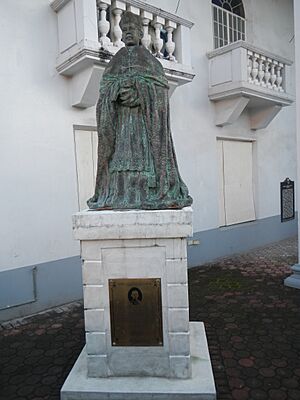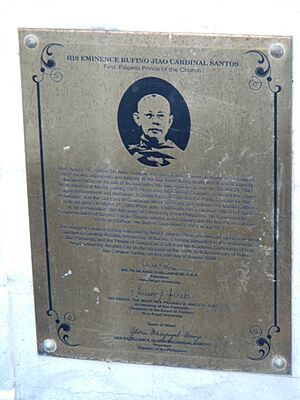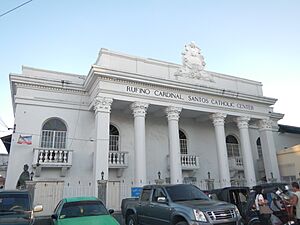Rufino Santos facts for kids
Quick facts for kids His Eminence Rufino Jiao Santos |
|
|---|---|
| Cardinal, Archbishop of Manila | |
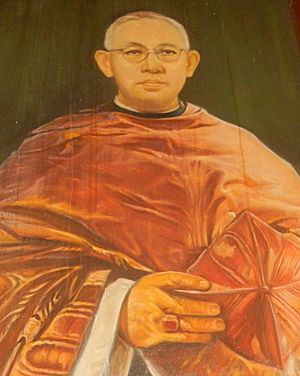 |
|
| Province | Manila (Emeritus) |
| See | Manila (Emeritus) |
| Enthroned | February 10, 1953 |
| Reign ended | September 3, 1973 |
| Predecessor | Gabriel M. Reyes |
| Successor | Jaime Sin |
| Other posts | Archdiocese of Manila Military Ordinariate (1951–73) |
| Orders | |
| Ordination | October 25, 1931 |
| Consecration | October 24, 1947 by Michael J. O'Doherty |
| Created Cardinal | March 28, 1960 |
| Rank | Cardinal-Priest |
| Personal details | |
| Birth name | Rufino Jiao Santos |
| Born | August 26, 1908 Guagua, Pampanga, The Philippine Islands |
| Died | September 3, 1973 (aged 65) Manila, Philippines |
| Buried | Crypt at the Manila Cathedral |
| Nationality | Filipino |
| Denomination | Roman Catholicism |
| Parents | Gaudencio Santos Rosalia Jiao |
| Motto | Caritas in Dilectione "Charity in Love" |
| Coat of arms |  |
Rufino Jiao Santos (born August 26, 1908 – died September 3, 1973) was an important leader in the Catholic Church in the Philippines. He served as the 29th Archbishop of Manila from 1953 until his death in 1973. He made history as the very first Filipino to become a Cardinal, which is a high-ranking official in the Catholic Church.
Contents
Learning About Rufino Santos
Rufino Jiao Santos was born in a place called Sto. Niño in Guagua, Pampanga. He was the fourth of seven children. His father, Gaudencio Santos, managed farmland near Mount Arayat. His mother was Rosalia Jiao y Romero. Rufino, who was nicknamed "Pinong," grew up close to his local church.
He was very active in church activities from a young age. He served as an acolyte (an altar server) and later sang in the choir. These experiences, along with encouragement from his parish priest, Father Jose Tahon, helped him decide to become a priest.
His Education and Early Priesthood
Rufino began his studies at San Carlos Seminary in 1921. He was a very bright student. In 1927, at just 19 years old, he received a special scholarship. This allowed him to study in Rome, Italy, at the Pontifical Gregorian University. There, he earned degrees in canon law (church law) and sacred theology (the study of religious faith).
He was allowed to become a priest even before he turned 24, which was the usual age. On October 25, 1931, when he was almost 23, Rufino J. Santos was ordained a priest in Rome. After returning to the Philippines, he worked as an assistant priest in Imus, Cavite, and later as a parish priest in Marilao, Bulacan.
Becoming Archbishop and Cardinal
In 1953, Rufino Santos was chosen to be the Archbishop of Manila. He officially took on this role on March 25, 1953. A few years later, on March 28, 1960, Pope John XXIII made him a Cardinal. This was a huge moment for the Philippines, as he was the first Filipino ever to reach this high position.
Rebuilding and Helping Others
As Archbishop, Cardinal Santos worked hard to help people and rebuild the church after World War II. He started Catholic Charities, which is now known as Caritas Manila. This organization helps many people in need. He also helped rebuild St. Paul Hospital, which is now called the Cardinal Santos Medical Center. This hospital had been damaged during the war.
One of his biggest projects was rebuilding the Manila Cathedral. It had been destroyed during the 1945 Liberation of Manila. The new cathedral was finished and opened in 1958.
Cardinal Santos also attended the Second Vatican Council. This was a very important meeting of Catholic bishops from all over the world. He was one of 49 bishops from the Philippines to be there. He helped write important documents about the Blessed Virgin Mary.
He also hosted Pope Paul VI when the Pope visited the Philippines for a meeting of Asian bishops. Cardinal Santos served as Archbishop of Manila for 20 years, from 1953 to 1973.
He also started Radio Veritas, a church-run radio station. He built other important places too, like the Our Lady of Guadalupe Minor Seminary and the Pius XII Catholic Center.
Cardinal Santos passed away in Manila on September 3, 1973, shortly after his 65th birthday.
| Styles of Rufino J. Cardinal Santos |
|
|---|---|
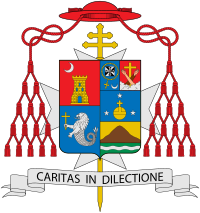 |
|
| Reference style | His Eminence |
| Spoken style | Your Eminence |
| Informal style | Cardinal |
| See | Manila |
His Lasting Impact
Cardinal Santos was the first Filipino cardinal. He became Archbishop of Manila after World War II. At that time, the Philippines faced many challenges. There was a big difference between rich and poor, and many people struggled.
He quickly set up an administrative board in 1953. This led to the creation of Caritas Manila, which helped organize the church's charity work. In the beginning, Caritas Manila focused on giving medical help, food, and clothes to those who needed it most.
Later, they started programs to help people find jobs and get an education. Medical help and emergency relief had a huge impact, reaching thousands of sick and poor people. Cardinal Santos's vision and kindness made Caritas Manila a great success. It is considered one of his most important achievements.
Remembering His Birth
In 2008, the CBCP celebrated the 100th anniversary of Cardinal Santos's birth. Cardinal Gaudencio Rosales led the special ceremonies in Cardinal Santos's hometown.
The event included unveiling a historical marker and a 6-foot statue of Cardinal Santos. There was also an exhibit of his personal items. These celebrations helped people remember his important contributions to the church and the country.
On September 3, 2018, which was 45 years after his death, another special Mass was held. This was to honor Cardinal Santos's legacy and prepare for the 60th anniversary of the rebuilt Manila Cathedral.
See also
- Jose Maria Delgado, Philippine Ambassador to the Vatican
 | Claudette Colvin |
 | Myrlie Evers-Williams |
 | Alberta Odell Jones |


